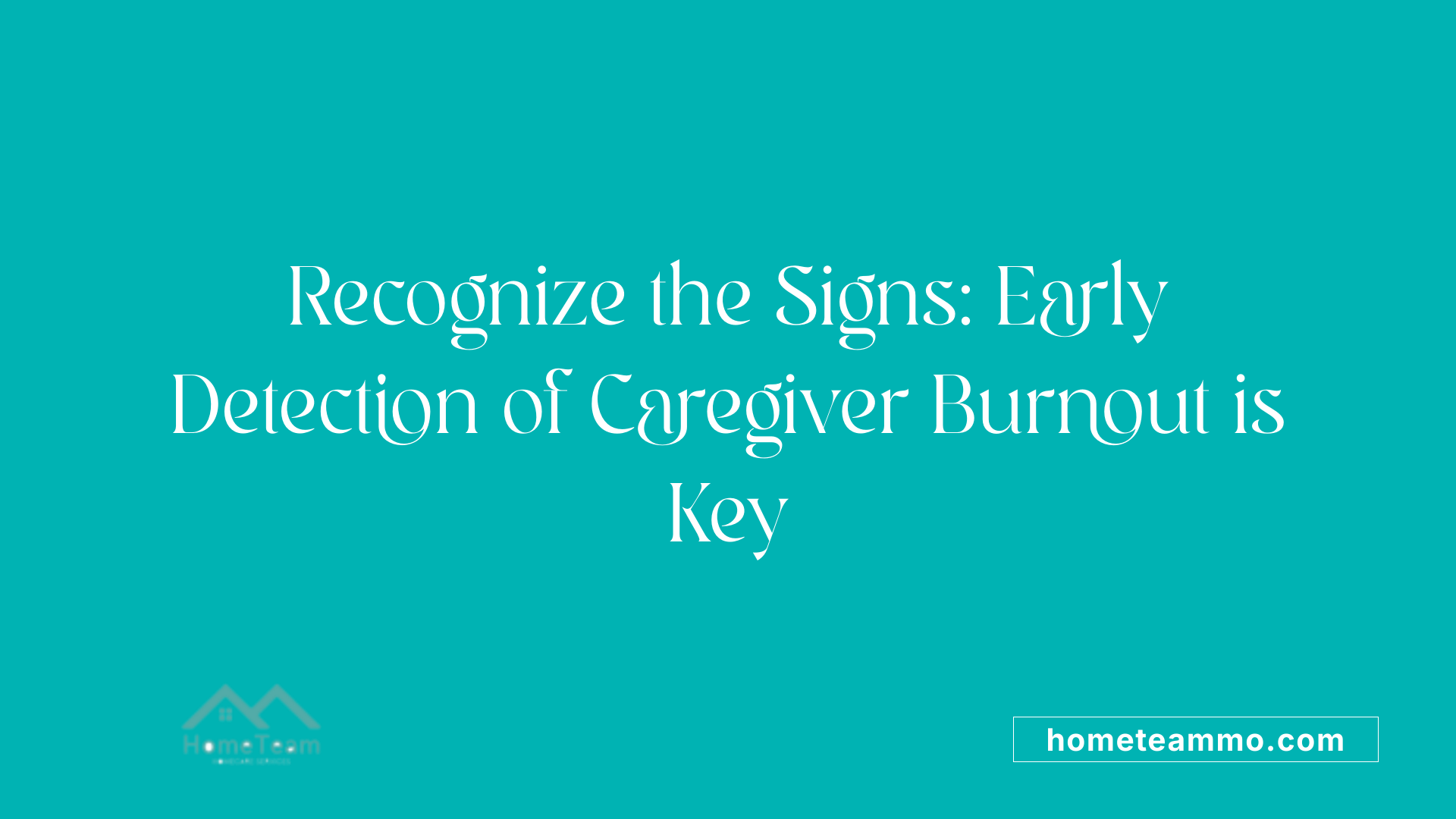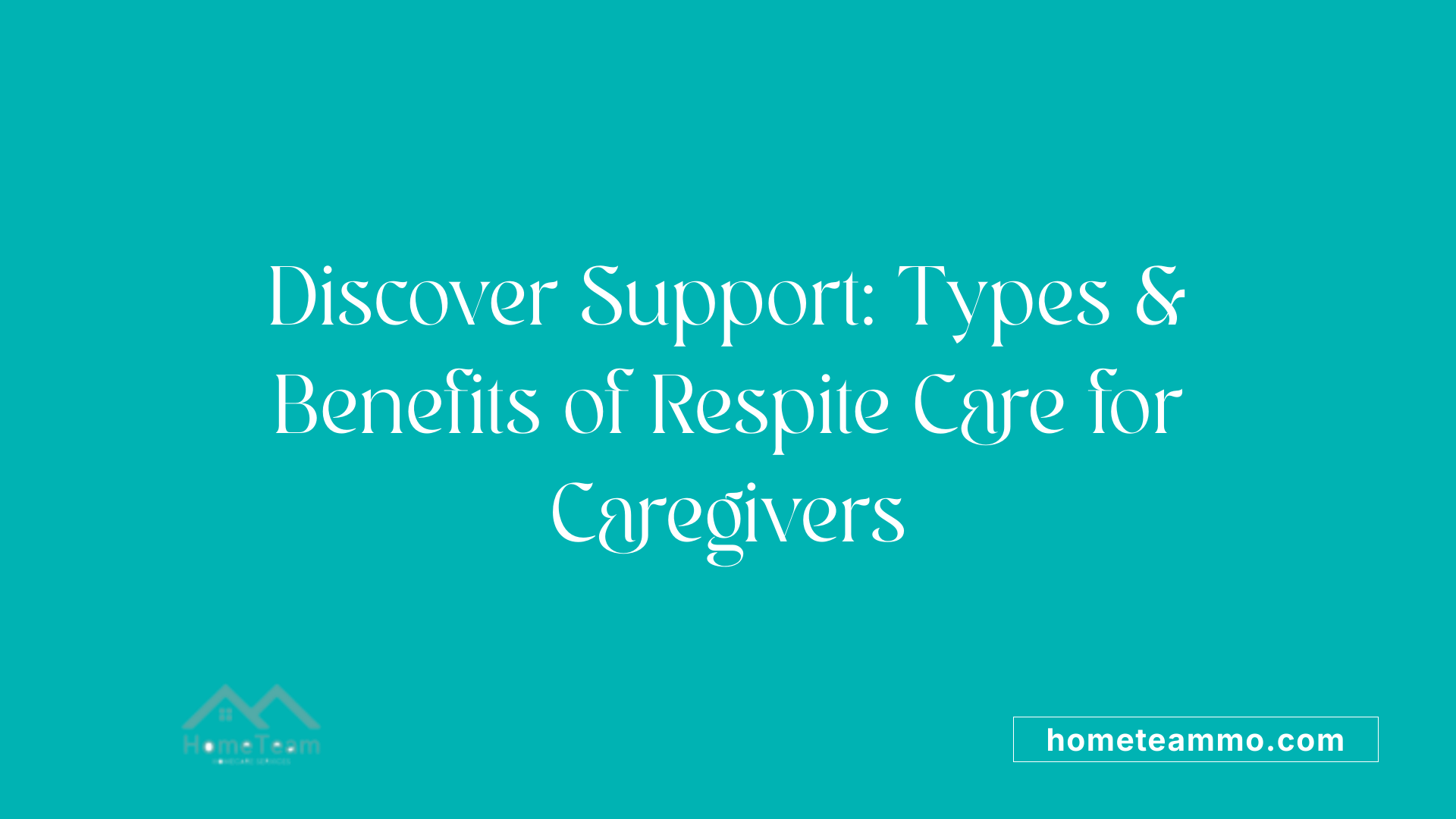Addressing Caregiver Burnout with Respite Care
Understanding the Essential Role of Respite Care in Alleviating Caregiver Burnout

The Critical Need for Support in Caregiving Contexts
Caregiving is a vital yet demanding role that can lead to emotional, physical, and mental exhaustion known as caregiver burnout. With over 40 million unpaid caregivers in the U.S., many grapple with symptoms like fatigue, emotional distress, and declining health. Recognizing the risks and leveraging resources such as respite care is essential for maintaining both caregiver well-being and quality of care. This article explores how respite care can serve as a protective tool against burnout, detail available types and benefits, and guide caregivers toward effective support strategies.
Defining and Recognizing Caregiver Burnout

What are the signs of caregiver burnout and when should a caregiver consider stopping caregiving?
Caregiver burnout is a state of emotional, physical, and cognitive exhaustion resulting from ongoing stress and demanding responsibilities. Recognizing its signs early is crucial to prevent serious health consequences.
Symptoms of burnout often include feelings of irritability, resentment, hopelessness, and being trapped in the caregiving role. Physically, caregivers may experience fatigue, sleep disturbances, worsening health conditions, and changes in appetite or weight.
Emotionally, signs such as increased anxiety, depression, and emotional withdrawal are common. Cognitive difficulties like trouble concentrating, decision fatigue, and forgetfulness can also develop, impairing daily functioning.
As burnout progresses, caregivers may begin to avoid contact with their loved ones, feel overwhelmed, and experience a decline in overall well-being. Frequent sickness or worsening chronic conditions can also indicate that one's self-care is neglected.
When these symptoms become persistent and interfere with the safety and quality of life for both caregiver and care recipient, it is time to reassess the situation. Recognizing these signs allows caregivers to seek support early.
Important steps include acknowledging personal limits, reaching out for help, delegating tasks, and exploring respite care options. Taking breaks and prioritizing self-care can help restore balance.
Caregivers should consider halting or modifying their caregiving duties when their health significantly deteriorates, when feelings of being overwhelmed become unmanageable, or when they can no longer provide safe, effective care. Ultimately, protecting their own well-being enables caregivers to continue providing care in a sustainable way, or to seek alternative arrangements if necessary.
The Role and Definition of Respite Care
Why is respite care important for caregivers?
Respite care plays a crucial role in supporting caregivers by offering them a much-needed break from their demanding duties. Caregiving can be emotionally and physically exhausting, often leading to burnout, stress, and health problems.
Providing temporary relief, respite care allows caregivers to focus on their own well-being, engage in self-care activities, visit healthcare providers, or simply rest. This break helps prevent emotional exhaustion, depression, fatigue, and anxiety—symptoms commonly associated with caregiver burnout.
Respite services are flexible and can be tailored to meet individual needs, whether through in-home care, adult day centers, or residential facilities. This flexibility ensures that caregivers can access support in a way that best fits their circumstances.
Using respite care not only benefits caregivers by reducing stress but also improves the quality of care provided to loved ones. When caregivers are rested and emotionally balanced, they are more patient, attentive, and effective in their caregiving role.
Ultimately, respite care is a vital resource that sustains the health and well-being of caregivers while ensuring that loved ones continue to receive compassionate and attentive care. It helps maintain family relationships, prevents social isolation, and promotes overall harmony within caregiving situations.
Types and Benefits of Respite Care Services

What resources are available for caregivers seeking support and respite care?
Caregivers looking for support and respite care options can access numerous resources through various organizations and agencies. National platforms like the ARCH National Respite Locator Service and the Eldercare Locator help families find local respite providers and services. These resources provide comprehensive information on different types of respite care, including formal and informal options, as well as in-home and out-of-home services.
Local agencies such as State Respite Coalitions and Lifespan Respite offer tailored programs and guidance to help caregivers navigate available options. Support groups, educational materials, and counseling are accessible through organizations like the Caregiver Action Network and AARP, providing emotional and practical support.
Practical support solutions include senior centers, adult day care programs, Meals on Wheels, and home health agencies. Financial assistance is also available through Medicaid, Medicare, and various community programs, easing the cost burden of respite care.
By leveraging these resources, caregivers can better understand the different models of respite care, find suitable providers, and plan for their own health and well-being while ensuring their loved ones receive safe, professional care.
Types of Respite Care Services
| Type of Respite Care | Description | Typical Setting | Duration | |-----------------------|--------------|-----------------|---------| | Formal respite care | Provided by trained professionals in structured settings | Adult day centers, nursing homes | Hours to weeks | | Informal respite care | Care provided by family, friends, or volunteers | At home or community-based | Varies | | In-home respite | Professional caregivers offer support at home | Private duty caregiving, visiting nurses | Hourly or daily | | Out-of-home respite | Temporary stays in facilities or specialized programs | Short-term nursing homes, assisted living | Days to weeks |
Specific services provided during respite care
Respite care encompasses a variety of services designed to support both the caregiver and care recipient. These include assistance with bathing, dressing, medication management, mobility support, and meal preparation. Companionship and social engagement activities help reduce feelings of isolation.
For individuals with complex needs, professional services ensure safety and proper health management. Out-of-home options secure planned or emergency overnight stays, offering extended relief for caregivers.
Accessing appropriate respite care can significantly improve caregiver well-being by preventing burnout, enhancing mental health, and maintaining the quality of care provided to loved ones.
Strategies for Managing and Preventing Burnout

What are effective strategies for managing and preventing caregiver burnout?
Managing and avoiding caregiver burnout requires a proactive combination of routines, support, and resource utilization. Establishing a consistent daily routine helps caregivers organize their responsibilities and reduces unpredictability, making caregiving more manageable.
Seeking social and emotional support is vital. Connecting with family, friends, or caregiver support groups provides emotional relief and validation. Sharing experiences and advice can lessen feelings of isolation and increase resilience.
Utilizing community and professional resources can significantly ease burdens. Respite services, whether through adult day centers or in-home professional care, provide necessary breaks. Many community organizations also offer counseling, education, and support programs tailored for caregivers.
Regularly scheduled breaks, including respite care, are essential to prevent emotional exhaustion. Maintaining physical health through proper nutrition, regular exercise, and sufficient sleep supports resilience.
Open communication with healthcare providers enables caregivers to address their own mental and physical health needs effectively. Exploring available community programs, such as local senior centers or national organizations like the Alzheimer’s Association, can provide additional support.
By prioritizing self-care, setting realistic goals, establishing routines, and leveraging support systems, caregivers can mitigate stressors associated with their role.
| Strategy | Actions | Benefits |
|---|---|---|
| Routine establishment | Create daily schedules for caregiving tasks | Reduces stress, increases predictability |
| Social and emotional support | Join support groups, talk with friends and family | Provides emotional relief, validation |
| Utilize community resources | Access respite care, counseling, caregiver training | Offers breaks, skills development, emotional support |
Overall, integrating these strategies into daily routines enhances caregiver well-being, reduces burnout risk, and promotes a healthier caregiving environment.
Maximizing the Impact of Respite Care for Long-term Well-being
How can respite care improve a caregiver's mental health and quality of life?
Respite care plays a crucial role in supporting caregivers by offering temporary relief from their demanding responsibilities. This break helps reduce feelings of stress and emotional exhaustion, often associated with long-term caregiving.
Different formats of respite, including short-term inpatient stays at care facilities, daytime adult day centers, or even vacation breaks, give caregivers time to rest, recover, and focus on their personal needs.
Accessing these services usually involves assessments by social services or healthcare providers. Funding options like charities, social support programs, or even personal funds make respite care accessible to many. Regular use of respite services fosters better emotional resilience, diminishes burnout symptoms, and enhances overall mental health.
By taking time for themselves, caregivers can maintain a more positive outlook and sustain their capacity to provide quality care long-term. Ultimately, respite care is essential for fostering a caregiver’s mental well-being, ensuring they remain healthy, balanced, and capable of caring for their loved ones.
Conclusion and Call to Action
 Respite care is an essential service that offers primary caregivers a much-needed break, helping to prevent burnout and support their well-being. It provides temporary relief through various options, including in-home services, adult day centers, or short-term stays in facilities like hospitals or nursing homes. Recognizing signs of burnout—such as fatigue, irritability, or emotional exhaustion—is crucial, and seeking support early can make a significant difference.
Respite care is an essential service that offers primary caregivers a much-needed break, helping to prevent burnout and support their well-being. It provides temporary relief through various options, including in-home services, adult day centers, or short-term stays in facilities like hospitals or nursing homes. Recognizing signs of burnout—such as fatigue, irritability, or emotional exhaustion—is crucial, and seeking support early can make a significant difference.
Key points include the importance of self-care, utilizing available resources, and understanding different types of respite care. According to sources, respite care can prevent negative health effects for caregivers and improve the quality of care received by loved ones. Funding options like Medicare, Medicaid, veteran programs, and community resources are available to help access these services.
If you are caring for a loved one, don't hesitate to explore respite care options. Taking a break not only benefits your health but also enriches your ability to provide compassionate, attentive care in the long run. Remember, prioritizing your well-being is vital—both for your sake and for those you care for.
To learn more about the importance of respite care and available resources, search for "respite care importance summary". Making use of these services can restore your energy, reduce stress, and strengthen your ability to care effectively.
Prioritizing Caregiver Well-Being Through Support and Respite
In conclusion, caregiver burnout is a widespread and significant challenge that can impact every aspect of a caregiver's life and their ability to provide quality care. Recognizing early signs and taking proactive steps—particularly by utilizing respite care—can make a profound difference. Respite care offers not only temporary relief but also promotes long-term well-being, emotional resilience, and a sustainable caregiving experience. Caregivers are encouraged to explore available resources, establish support networks, and incorporate respite services into their routine. Prioritizing self-care is not a sign of selfishness but a crucial element in sustaining the vital role of caregiving. Remember, seeking help and taking breaks are essential steps toward a healthier, more balanced life for caregivers and their loved ones.
References
- How Respite Care Brings Relief for Caregiver Burnout
- What Is Respite Care for Caregivers? - National Council on Aging
- Caregiver Respite: An Essential Component of Home & Community ...
- Caregiver burnout and strategies for coping | Health & wellness
- Caregiver Burnout Symptoms and Solutions: Why Respite Care ...
- Caregiver stress: Tips for taking care of yourself - Mayo Clinic
- Signs of Caregiver Burnout and How Respite Care Can Help

How to Address Common Challenges in Caregiving Relationships

How to Create a Comfortable and Safe Home Environment for Caregiving

How to Create a Safe Environment for In-Home Care

How Home Team Supports Caregivers with Training and Resources

How CDS Providers Assist with Home Organization and Cleaning

